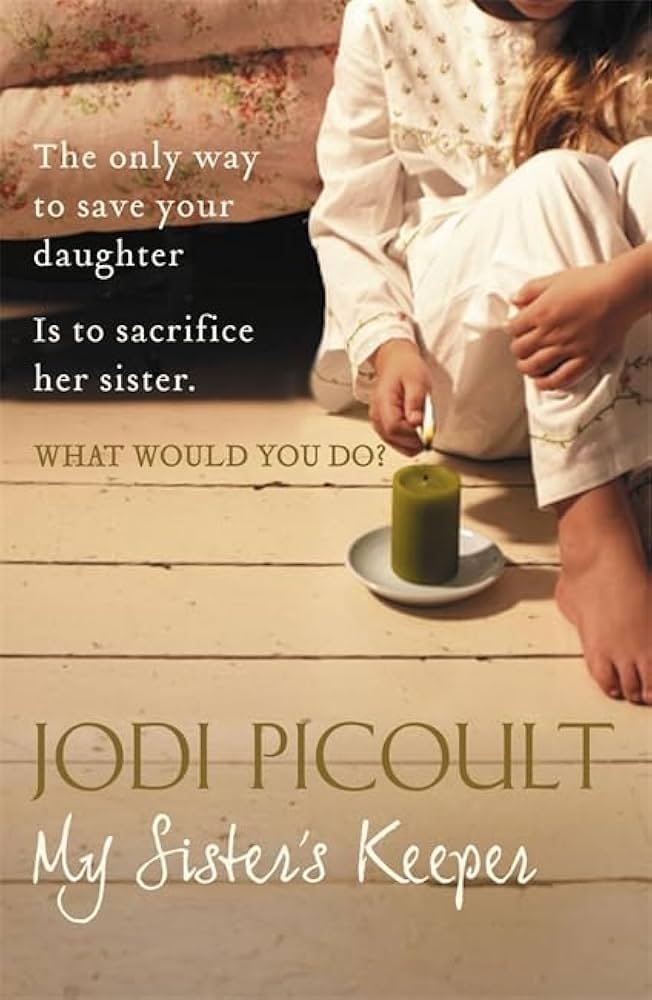My Sister's Keeper (A Mother's Perspective)
 (Source: https://www.amazon.com/My-Sisters-Keeper-Jodi-Picoult/dp/0340839864)
(Source: https://www.amazon.com/My-Sisters-Keeper-Jodi-Picoult/dp/0340839864)
How far would you go to save the one that you love? What if that someone was your child? My Sister's Keeper is a novel that reveals the incredible lengths one family will go in order to save their daughter from cancer.
"'When you care more if someone else lives than you do about yourself... is that what love's like?'
It is hard, all of a sudden, to pull an answer through the tunnel of my throat. 'Exactly.'"
While it is an amazing story, it is also an extremely controversial one... For one of the lengths that the Fitzgeralds go to involve creating a genetic "designer baby" to help cure her older sister. In a nutshell, they take from the youngest (Anna) in order to give to the oldest (Kate). Cord blood, steroid injections, lymphocytes -- until it reaches the climax of donating a kidney.
My Sister's Keeper explores the topic of loving children equally -- how, when it really comes down to it, it does not truly exist.
Let me explain... I am a mother myself. I have two young children -- two girls as well -- aged 2 and 4. I will tell you the truth... Parents love ALL of their children, but they do not love them all equally. There will always be favoritism in families of multiples, from both mom and dad. Parents will share individual moments with each and every child, they may TREAT them all equally, but loving equally is impossible. Some children will instantly bond with their parents; others will butt heads constantly. Everyone is unique -- even in families that share blood.
"'Did you ever feel, when you were a kid, that maybe they were playing favorites? ... We all know you're supposed to love your kids equal, but that's not always how it works out.'"
This is what makes for an interesting dynamic... It is obvious that the mother (Sara) has bonded with Kate over her other children; she sees herself in Kate. The connection is obvious enough that even the children take notice of it.
"'She couldn't tell you,' I reply. 'She was too afraid if she killed herself she'd be killing you, too.'"
Older brother Jesse becomes neglected because he serves no "purpose" within the family, proving that not only are children loved unequally; they can also be treated unequally. Whereas Anna is quite literally seen as a means to an end: keeping Kate alive. As much as mother Sara tries to justify the decisions for both daughters, that she loves them both equally, it is simply untrue. Kate will always be seen as the "wanted" child while Anna was just "planned."
Because, again, as a mother, here's my perspective: I would never "sacrifice" one of my children in an effort to "preserve" the other. I would never put my children in harm's way, regardless of the benefits. The entire purpose of being a parent is protecting your children at all costs. So that's done! I would not create a child for the sole purpose of saving another.
"I have thought of this daughter only in terms of what she will be able to do for the daughter I already have."
There is a scene in the book, when Anna is about 5-years-old, being prepared for a bone marrow transplant. Basically, the patient gets stabbed with a bunch of needles, in the hip, in order to extract stem cells. The anesthesia has not kicked in yet, and we are able to visualize young Anna, thrashing on the operating table as doctors try to hold her down, screaming, "I want my mommy! I want my daddy!!"
Everything in your being should be telling you to run to your child, that this is wrong. I don't understand how any parent can turn their back on that, with the moronic justification of, "We'll buy her a toy after, she'll forget the whole thing lol."
⚠️ Heavy Spoilers Impending ⚠️
So, as for the book itself -- the ending -- I was severely disappointed. Anna spends the entirety of the book trying to find her voice, trying to make the right decision, and the author ends up killing Anna off in a car crash. She is brain dead, and ultimately ends up sacrificing her kidney for older sister Kate anyway, completely diminishing all of the progress Anna had made.
In a situation such as this, there are no right and wrong answers. Anna was not obligated to donate her kidney, and advertently diminish Kate's quality of life. By that same token, Anna could have donated a kidney, possibly saving her or Kate could continue to die. I really feel like Anna should have been the one to survive, to give the book more meaning, but also to show that there are no fairytale endings. Sometimes you need to know when to let go, and this was a novel that definitely should have taken that route.